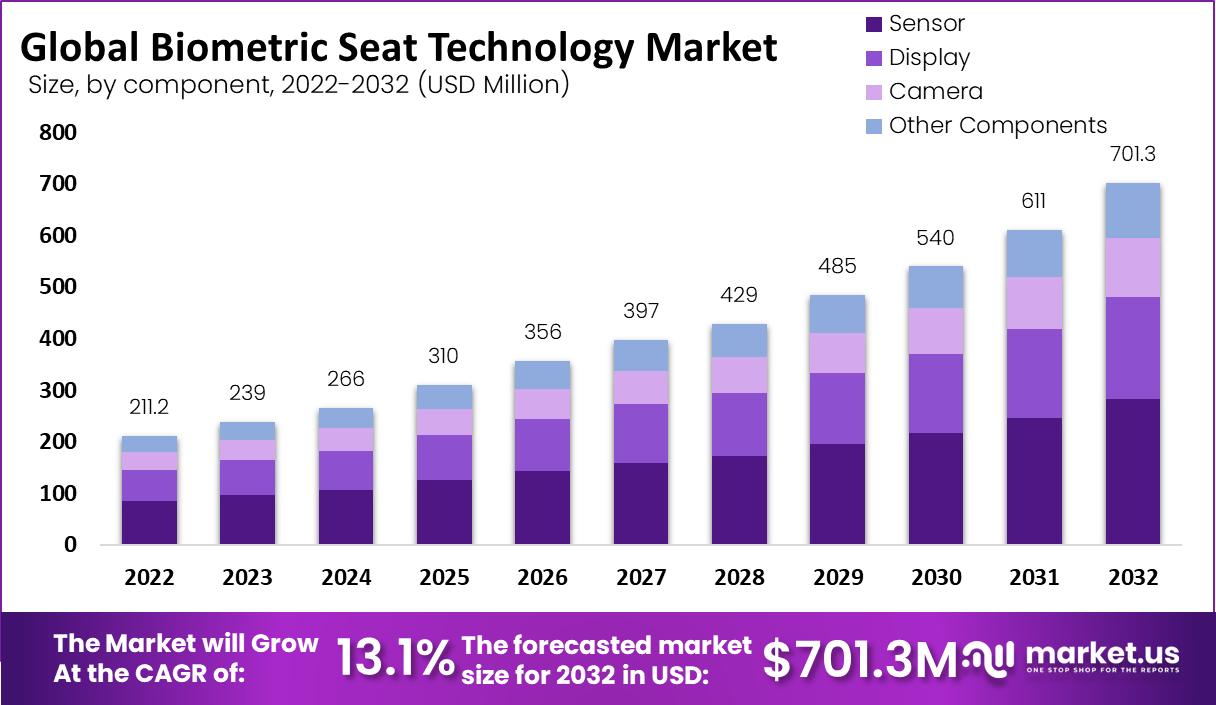Biometric Seat Technology Market Size to Reach USD 701.3 Mn by 2032 – Rise with Steller CAGR 13.1%

Page Contents
Published Via 11Press : In 2022, the global biometric seat technology market was valued at USD 211.2 million and is expected to reach USD 701.3 million in 2032. This market is estimated to register a CAGR of 13.1%. The stress level of the driver is measured by biometric seats at the time of driving.
Market growth can be attributed to various factors, including rising concerns over safety and security within the transportation industry, rising passenger comfort and entertainment system demand, as well as advanced driver assistance systems (ADASs) intended to enhance driving experiences while simultaneously improving driver safety.
Take Advantage of a Free Sample PDF Report | https://market.us/report/biometric-seat-technology-market/request-sample

Key Benefits
- Improved Security and Safety: Biometric seat technology offers increased levels of security and safety by offering biometric authentication to access vehicles – helping prevent unwarranted entry while decreasing risks from theft or other security threats.
- Biometric Seat Technology Can Enhance Passenger Comfort: Incorporating biometric seat technology can also maximize passenger comfort with customized seating settings that include temperature and massage settings that make their travel experience better.
- Better Driver Assistance: Biometric sensors embedded within seats may also aid with advanced driver assistance systems (ADAS), giving more-informed feedback to a car's artificial intelligence (AI) system for making decisions regarding driver behavior and vehicle handling.
- Increase Efficiency and Productivity: Biometric seat technology can assist organizations in increasing efficiency and productivity by shortening authentication processes – such as boarding an airplane or accessing rental cars – speedily and more easily than before.
- Improved Health Monitoring: Biometric sensors embedded within seats can monitor vital signs such as heart rate and respiration to provide more comprehensive health tracking data, particularly useful when monitoring individuals living with medical conditions.
- Enhance Personalization: Biometric seat technology offers personalized settings and preferences tailored specifically for each passenger, improving travel experiences while relieving any tension or discomfort associated with travel.
- Eco-Friendliness: Biometric seat technology can play a pivotal role in mitigating environmental damage by monitoring energy use and decreasing waste generation – creating more eco-friendly transport alternatives.
Regional Snapshot
- North America: North American market participants and technological advancements will likely lead to North American dominating Biometric Seat Technology market growth, due to a number of prominent market participants as well as technological innovations within their automotive industries and rising passenger comfort/safety demands that fuel its development of innovative Biometric Seat Technology solutions. This region boasts one of the strongest automotive industries globally with technological improvements providing increased demand for advanced Biometric Seat Technology solutions and driving market expansion.
- Europe: The European market is expected to experience rapid expansion during its forecast period. Home to some of the leading auto manufacturers and featuring strong automotive industries. Increased focus on vehicle safety coupled with adoption of advanced driver assistance systems (ADAS) have driven demand for Biometric Seat Technology solutions throughout this region.
- Asia-Pacific: This region is projected to experience rapid expansion during the forecast period due to rising demand for advanced technologies in countries like China, Japan and India. Furthermore, their rapidly developing automotive industries focus on passenger comfort and safety features that contribute significantly to overall market expansion.
- Middle East and Africa: This region is expected to experience steady growth during the forecast period as more advanced technologies enter the automotive sector, driving demand for advanced safety and security features such as Biometric Seat Technology solutions.
- Latin America: Latin America is expected to experience significant growth over the forecast period due to increased adoption of advanced automotive technologies in Latin American regions and rising demands for advanced safety and security features, which in turn are driving Biometric Seat Technology solutions demand.
Drivers
- Rising Demand for Passenger Comfort and Safety Features in Vehicles: An increase in passenger demand for advanced comfort and safety features has driven Biometric Seat Technology's adoption in vehicles. Biometric sensors located within each seat offer customized settings and preferences tailored specifically to each passenger, further enriching their travel experience while decreasing any associated stress or discomfort.
- Rising Security and Safety Concerns: Concerns surrounding security threats and safety issues have resulted in increasing interest for Biometric Seat Technology. Biometric authentication helps safeguard vehicles against unwarranted access and reduce theft or other security threats.
- Progresses in Automotive Technologies: Recent advances in automotive technologies like Advanced Driver Assistance Systems (ADAS) and connected cars are driving adoption of biometric seat technology. Biometric sensors in seats allow AI systems in cars to make informed decisions regarding driver behavior and vehicle handling, providing feedback through biometric sensors into AI systems of cars that help make more accurate assessments about driver behaviors and handling characteristics.
- Increased Demand for Eco-Friendly and Sustainable Travel: With increasing interest in eco-friendly and sustainable travel options comes increasing adoption of Biometric Seat Technology. Biometric sensors embedded within chairs help minimize energy use and waste production for more eco-friendly trips.
- Regulation Requirements and Standards: Biometric Seat Technology's adoption can be seen as driven by increasing regulatory requirements for vehicle security and passenger protection. Government agencies often mandate using advanced safety features within vehicles to help mitigate accidents while improving passenger protection.
Restraints
- High Cost of Implementation: Implementation costs associated with biometric seat technology can be an impediment to its spread in vehicles. Integrating biometric sensors and other components increases overall vehicle costs and may deter some buyers.
- Technical Challenges: One of the major limitations associated with biometric seat technology can be its technical obstacles, which requires complex algorithms and software applications for user authentication as well as personalized settings – these may prove challenging to develop and implement successfully, hindering market expansion.
- Data Privacy and Security Concerns: Rising concerns around data privacy and security pose another roadblock to Biometric Seat Technology market growth. Biometric information can easily be misused for unapproved access or identity theft, prompting alarm among customers.
- Reducing Awareness and Acceptance: Biometric Seat Technology has yet to reach widespread awareness within both automakers and their target consumers, meaning many may remain unfamiliar with its advanced safety and comfort features. Many consumers may see no value in paying extra for them.
- Dependence on Regulatory Standards and Mandates: Reliance on regulatory mandates can also present Biometric Seat Technology with obstacles that limit its market. Adoption may be constrained due to rules set by governments or regulatory bodies which differ according to region or country.
Opportunities
- Integration With Connected Cars: Biometric Seat Technology can present an incredible opportunity for the market. By feeding valuable data into AI systems of connected cars, Biometric Seat Tech could prove vital in improving vehicle handling, safety and efficiency.
- Emerging Applications in Aerospace Industry: Biometric Seat Technology has many emerging uses within the aeronautic industry that represent an opportunity for the market. By providing personalized settings and preferences to airline passengers, this technology enhances their travel experience while alleviating any anxiety.
- Increased Adoption in Emerging Markets: Biometric Seat Technology providers see emerging markets such as Asia-Pacific and Latin America as key sources for market expansion opportunities. Demand for passenger comfort and safety features drives their adoption; Biometric Seat Technology's growing adoption is being propelled forward as an answer.
- Advancements in Sensor Technology: Advancements in sensor technologies such as touchless biometric sensors and facial recognition sensors present Biometric Seat Technology with significant opportunities. Such sensors can enhance biometric authentication accuracy and speed while improving user experience and decreasing security threats.
- Emergence of Electric Vehicles: As more electric cars enter the marketplace, Biometric Seat Technology stands to benefit greatly. By helping reduce energy use and waste from electric cars, this technology offers sustainable travel alternatives.
Challenges
- Integration With Existing Systems: Integrating Biometric Seat Technology with existing automotive systems can be a significant challenge. The technology involves complex algorithms and software programs which may prove hard to integrate seamlessly.
- Limited Standardization and Interoperability: Biometric Seat Technology can also present challenges due to limited standardization and interoperability across markets, which may limit adoption while increasing costs and complexity for implementation.
- High Development and Deployment Costs: Biometric Seat Technology can present many market players with significant challenges regarding its development and deployment costs, particularly given its complex nature requiring advanced software and hardware components for implementation. These development and deployment expenses must also account for complexity associated with production systems as they apply directly to Biometric Seat Tech products.
- Regulatory and Legal Challenges: Biometric Seat Technology can also present major regulatory and legal obstacles, with its collection and use of sensitive biometric data posing privacy and security concerns for companies operating across multiple regions or countries. Local regulations or laws regarding how this data should be utilized present additional difficulties that must be navigated carefully when operating with multiple biometric data sets simultaneously.
- Limited Awareness and Acceptance: Biometric Seat Technology can face challenges related to limited awareness and acceptance among consumers and automakers, which could impede its market development. Consumers may not understand its purpose or value proposition which limits adoption rates as well as market expansion.
Market Segments
Based on Component
- Sensor
- Display
- Camera
- Other Components
Based on Technology
- Infrared Technology
- Implanted Sensor
- Other Technologies
Based on Vehicle Type
- Passenger Vehicle
- Commercial Vehicle
- Electric Vehicle
Key Players
Listed below are some of the most prominent global biometric seat technology industry players.
- ZF Friedrichshafen AG
- Robert Bosch GmbH
- Denso Corporation
- Continental AG
- Hitachi Ltd
- Fujitsu
- Ford Motor Company
- Panasonic Corporation
- Aptiv
- Mitsubishi Electric Corporation
- Synaptics Inc.
- Lear Corporation
- Faurecia
- Other Key Players
Inquire more or share questions if any, before the purchase on this report at | https://market.us/report/biometric-seat-technology-market/#inquiry
Top Impacting Factors
- Increased Priorities on Safety and Comfort: With vehicle manufacturers' increasing emphasis on providing premium safety features and maximum comfort levels for passengers, Biometric Seat Technology has gained in popularity as an aid for providing customized settings and preferences tailored specifically for individual users, improving comfort while decreasing risk. This technology can offer customized settings and preferences, increasing comfort while decreasing injuries or accidents occurring on the roads.
- Growing Demand for Electric Vehicles: As demand for electric vehicles surges, more manufacturers are turning to Biometric Seat Technology in an attempt to decrease energy use and waste in electric cars, creating more sustainable travel options.
- Technological Advancements in Sensor Technologies: Recent advances in sensor technologies like touchless biometric sensors and facial recognition sensors are revolutionizing biometric authentication processes, improving accuracy and speed while enriching user experiences and decreasing security threats.
- An Increase in Connected Car Adoption: With more and more cars using connected technologies such as Biometric Seat Technology for navigation purposes and artificial intelligence systems being adopted into vehicles today, more cars than ever require Biometric Seat Technology integration with their AI system to enhance vehicle handling, safety and efficiency. Biometric Seat Tech can offer valuable data insights that assist AI systems, improving overall vehicle management.
- Rise in Airline Passenger Comfort: Increased airline passenger comfort is driving adoption of Biometric Seat Technology across aerospace industry sectors, offering personalized settings and preferences tailored specifically for airline travelers, improving travel experiences while relieving any unnecessary discomfort during flights.
Report Scope
| Report Attribute | Details |
| The market size value in 2022 | USD 211.2 Mn |
| Revenue forecast by 2032 | USD 701.3 Mn |
| Growth Rate | CAGR Of 13.1% |
| Regions Covered | North America, Europe, Asia Pacific, Latin America, and Middle East & Africa, and Rest of the World |
| Historical Years | 2017-2022 |
| Base Year | 2022 |
| Estimated Year | 2023 |
| Short-Term Projection Year | 2028 |
| Long-Term Projected Year | 2032 |
Recent Development
- Integrating AI: Biometric seat technology is being integrated with artificial intelligence (AI), in order to increase accuracy when authenticating users and identify. AI algorithms can analyze biometric factors like facial recognition, fingerprint identification and voice identification – thus making identification process more reliable.
- Application in Automotive Industry: Biometric seat technology has quickly become a standard feature on high-end vehicles for security and comfort purposes, such as recognising biometric information from drivers in order to adjust settings such as seat position, mirror angle adjustment and temperature. Furthermore, this biometric tech helps prevent car theft by identifying unapproved drivers.
- Improved Security in Airline Industry: Biometric seat technology has also become part of airline operations to increase security and streamline check-in. Passengers now use biometric information like facial recognition or fingerprint identification for faster check-in and increased security at airports reducing wait times while improving overall security.
- Integration With Wearable Devices: Biometric seat technology is increasingly being integrated with wearable devices to offer users a more tailored experience. Smartwatches may be used to authenticate identity; once sitting down in their chair, biometric sensors automatically adapt settings according to individual preference.
Frequently Asked Question
Q: What is the current market size for the Biometric Seat Technology Market?
A: According to a report by Market.us, the Biometric Seat Technology Market was valued at USD 699.97 Million in 2022 and is expected to reach USD 2983.03 billion by 2032, growing at a CAGR of 15.6% during the forecast period.
Q: What are the key segments of the Biometric Seat Technology Market?
A: The Biometric Seat Technology Market can be segmented based on Component (Sensor, Display, Camera, Other Components), Based on Technology (Infrared Technology, Implanted Sensor, Other Technologies), Based on Vehicle Type(Passenger Vehicle, Commercial Vehicle, Electric Vehicle), and geography (North America, Europe, Asia-Pacific, Latin America, and Middle East & Africa).
Q: Who are the key players in the Biometric Seat Technology Market?
A: Some of the key players in the Biometric Seat Technology Market include ZF Friedrichshafen AG, Robert Bosch GmbH, Denso Corporation, Continental AG, Hitachi Ltd, Fujitsu, Ford Motor Company, Panasonic Corporation, Aptiv, Mitsubishi Electric Corporation, Synaptics Inc., Lear Corporation, Faurecia, Other Key Players.
Contact us
Contact Person: Mr. Lawrence John
Market.us (Powered By Prudour Pvt. Ltd.)
Tel: +1 718 618 4351
Send Email: [email protected]
Content has been published via 11press. for more details please contact at [email protected]
The team behind market.us, marketresearch.biz, market.biz and more. Our purpose is to keep our customers ahead of the game with regard to the markets. They may fluctuate up or down, but we will help you to stay ahead of the curve in these market fluctuations. Our consistent growth and ability to deliver in-depth analyses and market insight has engaged genuine market players. They have faith in us to offer the data and information they require to make balanced and decisive marketing decisions.



